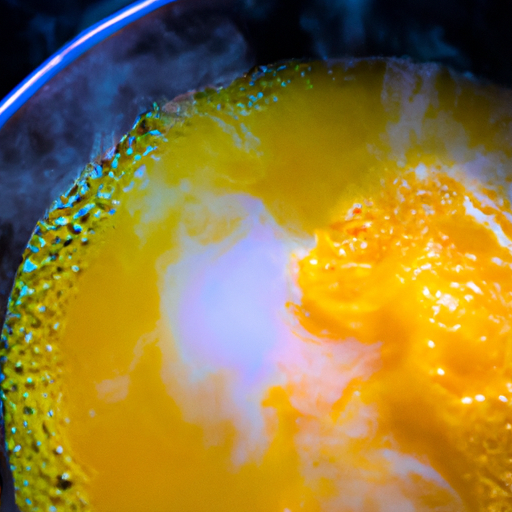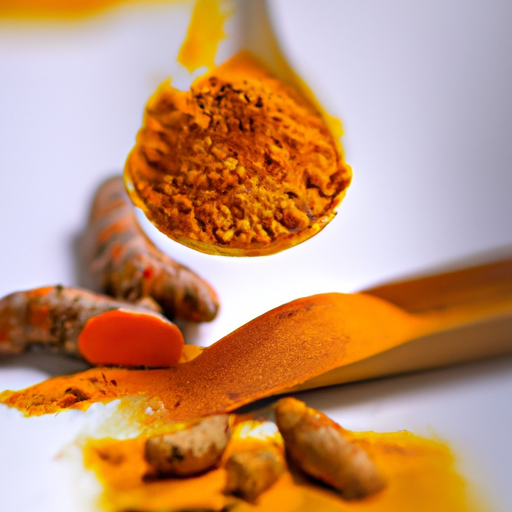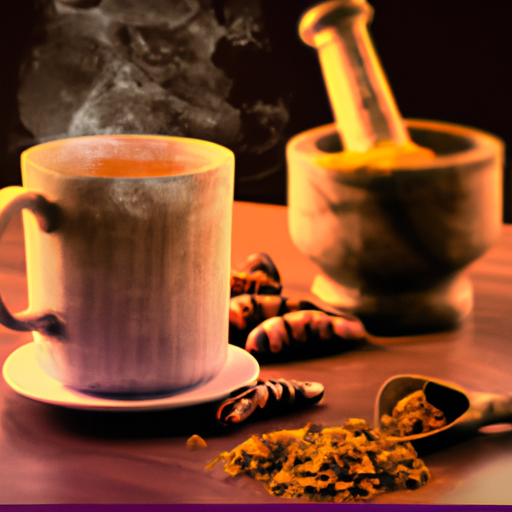In the realm of natural remedies, turmeric tea has gained popularity for its numerous health benefits. From reducing inflammation to promoting digestion, this vibrant yellow spice has been hailed as a wonder potion. However, like any good thing, it is possible to have too much of it. As the saying goes, ‘everything in moderation.’
In this article, we will delve into the potential side effects of drinking excessive amounts of turmeric tea. While turmeric is generally safe for consumption, consuming it in large quantities can lead to digestive disturbances, allergic reactions, and even interference with certain medications. Furthermore, excessive intake of turmeric tea may contribute to iron deficiency, increased risk of bleeding, and liver damage. Additionally, some individuals may experience skin discoloration as a result of excessive turmeric consumption.
It is important to be aware of these potential side effects in order to make informed decisions about incorporating turmeric tea into our daily routines.
Key Takeaways
- Excessive consumption of turmeric tea can lead to digestive disturbances, allergic reactions, interference with certain medications, and liver damage.
- Digestive disturbances may include bloating, diarrhea, and increased production of gastric acid.
- Allergic reactions to turmeric tea can manifest as itching, hives, swelling, and difficulty breathing.
- Turmeric tea may interfere with the effectiveness of certain medications, increase bleeding risk, decrease drug effectiveness, enhance side effects, and alter blood sugar levels.
Digestive Disturbances
Excessive consumption of turmeric tea can lead to gastrointestinal issues, such as bloating and diarrhea, which may disrupt the normal functioning of the digestive system. While turmeric is generally well-tolerated, consuming large amounts may cause stomach discomfort and bloating. This is because turmeric contains a compound called curcumin, which can stimulate the production of gastric acid and increase the risk of acid reflux and bloating.
Additionally, curcumin has been found to have a laxative effect, which can lead to loose stools and diarrhea. It’s important to note that these digestive disturbances are more likely to occur when turmeric tea is consumed in excessive amounts or on an empty stomach. To reduce the risk of experiencing these side effects, it’s recommended to consume turmeric tea in moderation and with food.
Moving on to allergic reactions, while rare, some individuals may develop an allergic reaction to turmeric. Symptoms may include itching, hives, swelling, and difficulty breathing. If you experience any of these symptoms after consuming turmeric tea, it’s important to seek medical attention immediately. Allergic reactions to turmeric are more common in individuals who are allergic to other members of the ginger family, such as ginger and cardamom.
Allergic Reactions
Indulging in an abundance of turmeric tea can potentially trigger allergic reactions, urging you to be cautious of your consumption. While turmeric tea offers numerous health benefits, such as reducing inflammation and boosting immunity, it is important to be aware of potential allergic reactions that can occur. Allergies to turmeric are relatively rare but can manifest in various ways, including skin rashes, itching, swelling, and even difficulty breathing. If you experience any of these symptoms after consuming turmeric tea, it is essential to seek medical attention promptly.
To provide a comprehensive overview of allergic reactions to turmeric tea, here is a table highlighting common symptoms, prevalence, and suggested actions:
| Symptom | Prevalence | Suggested Action |
|---|---|---|
| Skin rash | Rare | Consult a healthcare provider |
| Itching | Occasional | Discontinue tea consumption |
| Swelling | Rare | Seek immediate medical help |
| Difficulty breathing | Extremely rare | Call emergency services |
| Anaphylaxis | Very rare | Seek emergency medical care |
Remember, moderation is key when enjoying the benefits of turmeric tea. In the next section, we will explore how turmeric tea may interfere with certain medications, highlighting the importance of discussing any potential interactions with your healthcare provider.
Interference with Medications
Be cautious of how turmeric tea may potentially interact with your medications, and have you ever wondered if turmeric tea could affect the effectiveness of your prescribed drugs? While turmeric has many health benefits, it’s important to be aware of potential drug interactions that may occur when consuming turmeric tea. Here are four possible ways turmeric tea could affect the effectiveness of your medications:
-
Increased Bleeding Risk: Turmeric has natural blood-thinning properties, which could potentially amplify the effects of blood-thinning medications like warfarin or aspirin, leading to an increased risk of bleeding.
-
Decreased Drug Effectiveness: Turmeric may interfere with the absorption or metabolism of certain medications, reducing their effectiveness. This is particularly important for drugs with a narrow therapeutic window, where even small changes in dosage can have significant consequences.
-
Enhanced Side Effects: Turmeric tea may exacerbate the side effects of certain medications, such as nonsteroidal anti-inflammatory drugs (NSAIDs) or drugs used to lower blood pressure.
-
Altered Blood Sugar Levels: Turmeric has been shown to lower blood sugar levels, which may interact with medications used to treat diabetes, potentially leading to hypoglycemia.
It’s essential to consult your healthcare provider before incorporating turmeric tea into your routine, especially if you’re taking any medications. By understanding the potential drug interactions, you can make informed decisions about your health.
Moving forward, let’s explore how turmeric tea may impact individuals with iron deficiency.
Iron Deficiency
Turmeric tea can have an impact on individuals with iron deficiency, so it’s important to be aware of this potential effect. Iron is an essential mineral that plays a crucial role in transporting oxygen throughout the body. When iron levels are low, it can lead to iron deficiency anemia, causing fatigue, weakness, and other health issues.
Studies have shown that turmeric contains compounds called polyphenols, which can inhibit the absorption of iron from the diet. This means that individuals with iron deficiency may experience further difficulties in getting enough iron from their food when consuming turmeric tea. It is important for these individuals to take preventive measures and find dietary alternatives to ensure they meet their iron needs.
To make it easier to understand, here is a table summarizing some prevention methods and dietary alternatives for individuals with iron deficiency:
| Prevention Methods | Dietary Alternatives |
|---|---|
| Avoid consuming turmeric tea with meals | Consume iron-rich foods such as red meat, leafy greens, and legumes |
| Consider taking iron supplements under medical guidance | Include vitamin C-rich foods like citrus fruits to enhance iron absorption |
| Consult with a healthcare professional for proper iron management | Use cast-iron cookware to increase iron content in food preparation |
It is important for individuals with iron deficiency to be mindful of their turmeric tea consumption and take necessary precautions to ensure adequate iron intake. By doing so, they can prevent further complications related to iron deficiency. Transitioning into the next section, excessive turmeric consumption can also lead to an increased risk of bleeding.
Increased Risk of Bleeding
If you’re a fan of turmeric tea, it’s important to be aware that excessive consumption can increase your risk of bleeding. Turmeric contains a compound called curcumin, which has been found to have blood-thinning properties. While this can be beneficial for some individuals, such as those with blood clotting disorders, it can also be problematic for others. Increased blood thinning can lead to a higher risk of bleeding, especially if you’re already taking medications that thin the blood or have a history of bleeding disorders.
It’s important to be mindful of this potential side effect and to speak with your healthcare provider if you have any concerns.
Additionally, pregnant women should exercise caution when consuming turmeric tea. Some studies suggest that high doses of curcumin may stimulate the uterus or promote menstrual flow, which could potentially increase the risk of miscarriage or early labor. While more research is needed to fully understand the effects of turmeric on pregnancy, it’s generally recommended that pregnant women consume turmeric in moderation and consult with their healthcare provider.
Moving forward, let’s now discuss another potential side effect of excessive turmeric tea consumption: liver damage.
Liver Damage
Watch out for excessive consumption of turmeric tea as it can put your liver through a rollercoaster ride, potentially leading to serious damage. While turmeric tea is known for its numerous health benefits, it’s important to consume it in moderation to avoid any negative effects on the liver.
Here are three reasons why you should be cautious:
-
Overloading the liver: Turmeric contains a compound called curcumin, which gives it its vibrant yellow color. While curcumin has antioxidant and anti-inflammatory properties, consuming too much of it can overwhelm the liver. The liver is responsible for metabolizing and detoxifying substances in the body, and excessive intake of curcumin can strain its functions.
-
Interference with medication: Turmeric, including its tea form, can interfere with certain medications that are metabolized by the liver. It may affect the efficacy and safety of drugs such as blood thinners, statins, and anti-inflammatory drugs. It’s crucial to consult with your healthcare provider if you’re taking any medications before incorporating turmeric tea into your daily routine.
-
Liver damage: Although rare, excessive consumption of turmeric tea can lead to liver damage. Studies have shown that high doses of curcumin can cause liver toxicity in some individuals. It’s essential to be mindful of your turmeric tea intake and listen to your body. If you experience any unusual symptoms such as abdominal pain, jaundice, or dark urine, seek medical attention immediately.
As we explore the potential side effects of drinking too much turmeric tea, it’s important to mention another possible consequence – skin discoloration.
Skin Discoloration
After learning about the potential liver damage caused by excessive consumption of turmeric tea, I was curious to delve deeper into the side effects. To my surprise, I discovered that another possible consequence of indulging in this vibrant beverage is skin discoloration.
While turmeric is known for its numerous health benefits, including its anti-inflammatory and antioxidant properties, excessive intake can lead to a condition called hyperpigmentation. This occurs when the skin produces an excess of melanin, resulting in patches of darker skin.
To illustrate the potential effects of drinking too much turmeric tea, let’s take a closer look at a table that showcases both the benefits and adverse effects of this popular beverage.
| Benefits of Turmeric Tea | Side Effects of Excessive Consumption |
|---|---|
| Reduces inflammation | Skin discoloration |
| Boosts immune system | Liver damage |
| Improves digestion | |
| Supports heart health |
To avoid skin discoloration, it is crucial to consume turmeric tea in moderation. Additionally, it is worth mentioning that there are various turmeric tea recipes available that incorporate other ingredients, such as ginger or honey, which can enhance the taste and further amplify the health benefits. Remember, balance is key when enjoying this golden elixir.
Frequently Asked Questions
Can drinking too much turmeric tea lead to weight gain or weight loss?
Drinking too much turmeric tea can potentially affect metabolism, but its impact on weight gain or loss is not well-established. Turmeric tea may help control appetite, but more research is needed to fully understand its effects.
Is it safe to consume turmeric tea during pregnancy?
During pregnancy, it is generally safe to consume turmeric tea in moderation. It can provide potential benefits like reducing inflammation and supporting digestive health. However, it’s important to consult with a healthcare professional before adding any new herbal tea to your diet.
Can excessive consumption of turmeric tea cause kidney damage?
Excessive consumption of turmeric tea may pose a kidney damage risk, as it contains oxalates. However, moderate intake is generally safe. Other health effects may include gastrointestinal issues and allergic reactions in some individuals.
Does turmeric tea have any impact on blood pressure levels?
Drinking turmeric tea may have a positive impact on blood pressure levels. It could potentially improve cholesterol levels and offer benefits for heart health. However, it’s important to be mindful of the side effects of excessive consumption.
Are there any potential interactions between turmeric tea and herbal supplements?
There may be potential interactions between turmeric tea and prescription medications. It is important to consult with a healthcare professional before combining turmeric tea with other herbal supplements to ensure safety and potential benefits.
Conclusion
In conclusion, while turmeric tea offers numerous health benefits, it’s important to consume it in moderation. Drinking excessive amounts may lead to digestive disturbances, such as bloating or diarrhea, which can put a damper on your day.
Additionally, allergic reactions and interference with medications are potential risks. Picture yourself enjoying a warm cup of turmeric tea, but remember to savor it responsibly. Like a delicate balancing act, finding the right amount ensures you reap its benefits without any unwanted side effects.










